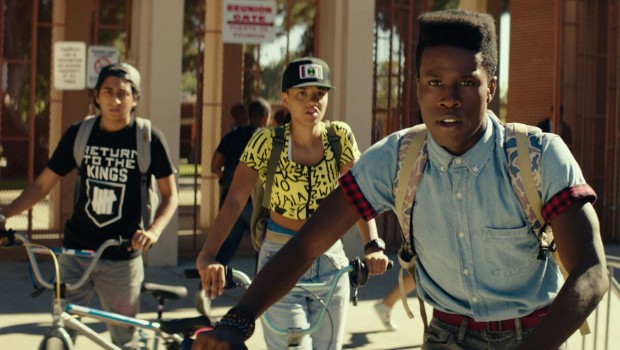By Molly Miller
First introduced at the 2015 Sundance Film Festival, Dope follows the lives of three nineties-obsessed, beyond-their-age type teens from the mean streets of Inglewood, CA.
Praised for advancing cultural narratives and diversity in films, this production was definitely an important career boost for Writer-Director Rick Famuyiwa.
The main character, Malcolm, is played by Shameik Moore, an Atlanta native whom you might recognize from his rap career or the 2016 critically-acclaimed Netflix original series The Get Down.
Malcolm is the pseudo-typical American success story- a poor kid from the rough side of town seeking to attend Harvard University and make a name for himself.
As a person with certain amounts of privilege. a white, cisgender, suburban individual from a city where tolerance for all kinds of people was the well-established norm, I appreciate the diversity of perspectives offered from this film.
Malcolm is not the stereotypical representative we are used to on the big screen – a smart, nerdy, black kid aspiring for the Ivy Leagues who finds himself, by no choice of his own, mixed up with some very bad people.
His best friends, an equally smart and driven Latino student and a black lesbian teenager offer media representation that is all too lacking in many American productions.
Through an unlucky series of events, the trio finds themselves in possession of thousands of dollars of illegal drugs, and several different people who are trying to get those drugs back.
The movie occurs over a couple days, and all the while Malcolm is attempting to prep for and attend his Harvard Alumni interview.
If that’s not enough to draw you in, the town’s local drug dealer and provider of comic relief throughout the film is played by the one and only A$AP Rocky.
Without delving into too many spoiler alerts, the remainder of the film contains some drug peddling activities, a chase scene, and the most satisfying movie ending you will ever watch.
The plot of this movie is unmatched by any other relevant film of the year and comes from the perspective that many of us are unused to in films of this type. Malcolm’s narration throughout the film is tasteful and advances the plot in ways the writer would be unable to if it were not included.
It is difficult to create necessary narration which adds to the quality of the film without coming across as a fable or simply taking the easy route and not directing a scene to describe the events, but Famuyiwa achieves this and more.
Beyond the obviously topical and interesting plotline, this film offers some amazing cinematography. The camera angles and scene introductions are as unique and captivating as the narrative’s cast.
The diversity, direction and quality of narration offered by Dope is unmatched by many other films with similar plotlines, lending it an almost perfect review by viewers on Netflix.
Although the title and content may be distasteful to some, it is a modern, ground-breaking film with an amazing cast and some seriously “dope” social commentary.








